#erp services
Text
NetSuite Implementation
Being a skilled NetSuite implementation partner, our commitment to delivering quality services has been unwavering for more than 3 years. Over this time span, our team of dedicated professionals has continually honed their expertise, ensuring a depth of knowledge that goes beyond the surface level. As a NetSuite implementation partner, we pride ourselves on not just meeting but exceeding the expectations of our clients, fostering long-term relationships built on trust and success. Through our extensive experience, we have fine-tuned our approach, staying attuned to the evolving landscape of NetSuite solutions and best practices. Our enduring commitment to excellence positions us as a reliable and proven choice for businesses seeking a partner with a track record of successful NetSuite implementations.
2 notes
·
View notes
Text
https://www.uneecops.com/erp/sap-services/
Get SAP Service From India's No-1 Company
Uneecops offers SAP services & solutions to unlock the value of your SAP application portfolio with the power of intelligence, innovation & industry.
2 notes
·
View notes
Text
SAP Business One | ERP Software for Small Businesses

ITOSS Solution has extensive exposure in setting up/modernizing IT Infrastructure. Our experts have provided consultancy to a large number of organizations for managing the entire company’s IT infrastructure. A big challenge for SMEs in setting up the proper infrastructure at nominal prices and ITOSS is focusing on that area along with the SAP Business One ERP Solution, specially tailored for SMEs. We keep adding world-class solutions to our portfolio to fulfill customer requirements in the most cost-effective manner and short deployment timeline.
#sap business one#SAP Business One partner#SAP Business One Partner in India#SAP Business One ERP Solution#SAP Business One for Manufacturers#ERP Solution#best erp solution#best erp software#erp services#SAP ERP#ERP Software#erp
2 notes
·
View notes
Text
Maximizing Efficiency: The Role of ERP Solutions for Manufacturers.
In the ever-evolving landscape of manufacturing, efficiency, productivity, and adaptability are key factors that determine success. Manufacturers face a myriad of challenges, from fluctuating demand and supply chain complexities to inventory management issues and production inefficiencies. To address these challenges and stay competitive in the market, many manufacturers are turning to Enterprise Resource Planning (ERP) solutions. These comprehensive ERP Software Solution integrate and automate core business processes, providing real-time insights and enabling better decision-making. In this article, we explore the transformative impact of ERP solutions for manufacturers, highlighting their benefits and the role of ERP companies in facilitating their implementation.
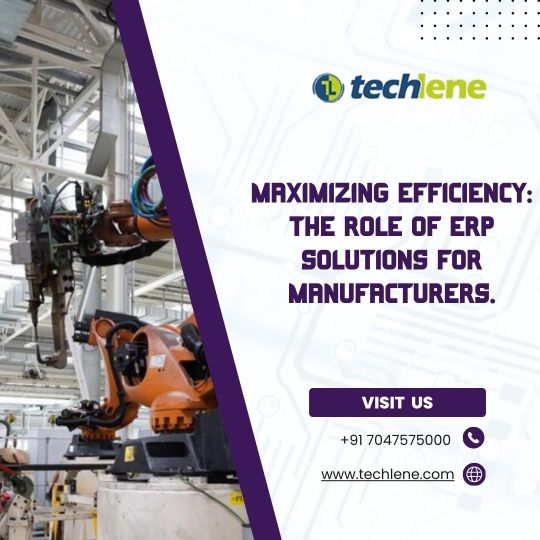
Understanding the Challenges of Manufacturers
Manufacturers operate in a dynamic environment characterized by rapid changes in demand, evolving customer preferences, and fierce competition. Some of the key challenges faced by manufacturers include:
Inventory Management: Balancing inventory levels, minimizing stockouts, and optimizing storage space while ensuring timely availability of materials for production.
Production Planning: Efficiently scheduling production workflows, allocating resources, and minimizing downtime to meet production targets and customer orders.
Supply Chain Management: Coordinating with suppliers, managing raw material procurement, and ensuring timely delivery of components to maintain production schedules.
Quality Control: Maintaining consistent product quality, ensuring compliance with industry standards, and minimizing defects and rework.
Data Visibility and Integration: Consolidating data from various sources, ensuring data accuracy, and providing real-time visibility into production processes and performance metrics.
The Role of ERP Solutions for Manufacturers
ERP solutions offer manufacturers a centralized platform to address these challenges and streamline their operations. Some of the key features and functionalities of ERP systems for manufacturers include:
Inventory Management: ERP systems enable manufacturers to track inventory levels in real-time, automate replenishment processes, and optimize inventory turnover ratios.
Production Planning and Scheduling: ERP solutions facilitate efficient production planning by providing insights into demand forecasts, resource availability, and production capacities.
Supply Chain Management: ERP systems integrate with suppliers and logistics partners, automating procurement processes, and providing visibility into supplier performance and lead times.
Quality Management: ERP solutions incorporate quality control modules to track product quality, manage inspection processes, and ensure compliance with regulatory requirements.
Business Intelligence and Analytics: ERP systems offer reporting and analytics tools to analyze production data, identify trends, and make data-driven decisions to improve efficiency and reduce costs.
Benefits of ERP Solutions for Manufacturers
The adoption of ERP solutions offers several benefits for manufacturers, including:
Improved Efficiency: ERP systems streamline business processes, eliminate manual tasks, and reduce errors, leading to increased efficiency and productivity.
Enhanced Visibility: ERP solutions provide real-time insights into production processes, inventory levels, and supply chain performance, enabling better decision-making and strategic planning.
Cost Reduction: By optimizing inventory management, production planning, and supply chain processes, ERP solutions help reduce operating costs and improve profitability.
Scalability and Flexibility: ERP systems are scalable and customizable, allowing manufacturers to adapt to changing business requirements and scale their operations as needed.
Better Compliance and Risk Management: ERP solutions help manufacturers ensure compliance with industry regulations, minimize risks, and improve overall operational control.
The Role of ERP Companies in Implementation
ERP companies play a crucial role in the successful implementation of ERP solutions for manufacturers. They provide a range of services, including:
Consultation and Needs Assessment: ERP companies work closely with manufacturers to understand their business requirements, challenges, and objectives, and recommend the most suitable ERP solution.
System Implementation: ERP companies oversee the implementation process, including system configuration, data migration, and customization to meet the specific needs of manufacturers.
Training and Support: ERP companies provide training to manufacturers' employees on how to use the ERP system effectively and offer ongoing support and maintenance services to ensure smooth operation.
Integration with Third-party Systems: ERP companies assist manufacturers in integrating the ERP system with existing systems and applications, ensuring seamless data flow and process integration.
Continuous Improvement: ERP companies help manufacturers leverage the full potential of ERP solutions by providing insights, recommendations, and updates to optimize system performance and drive continuous improvement.
Conclusion
In conclusion, ERP solutions have become indispensable tools for manufacturers seeking to enhance efficiency, productivity, and competitiveness. By streamlining operations, optimizing resources, and providing real-time insights, ERP solutions enable manufacturers to overcome challenges, adapt to changing market conditions, and drive sustainable growth. With the support of ERP companies, manufacturers can successfully implement and leverage ERP solutions to achieve their business goals and stay ahead of the competition in today's fast-paced manufacturing landscape.
0 notes
Text
Enhancing Steel Manufacturing Efficiency: The Role of ERP Solutions
In the dynamic and competitive landscape of the steel industry, efficient management of resources, production processes, and inventory is paramount for success. As steel manufacturers strive to meet growing demand while maintaining profitability, the implementation of Enterprise Resource Planning (ERP) solutions emerges as a critical factor in streamlining operations and driving sustainable growth. In this article, we delve into the significance of ERP software services tailored specifically for the steel industry, exploring their benefits, key features, and the transformative impact they can have on steel manufacturing operations.
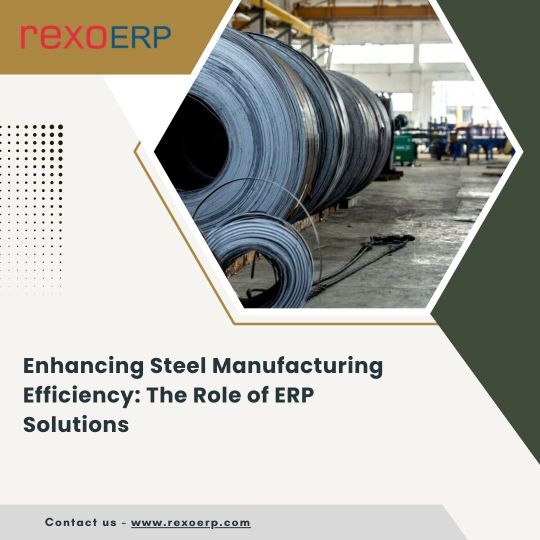
Understanding the Challenges of the Steel Industry
Steel manufacturing is a complex and multifaceted process that involves various stages, from raw material procurement to production planning, quality control, and distribution. Steel companies often face challenges such as fluctuating raw material prices, volatile market demand, stringent quality standards, and intense competition. Managing these challenges efficiently requires robust systems and processes that can adapt to changing market dynamics while ensuring operational efficiency and cost-effectiveness.
The Role of ERP Solutions in Steel Manufacturing
ERP solutions play a crucial role in addressing the unique challenges of the steel industry by integrating and automating core business functions across the entire value chain. These solutions provide a centralized platform for managing diverse operations, including:
Raw Material Procurement: ERP systems enable steel manufacturers to optimize sourcing strategies, track raw material inventory levels, and manage supplier relationships effectively. By integrating with supply chain networks and market intelligence systems, ERP solutions facilitate real-time monitoring of raw material prices and availability, enabling timely procurement decisions.
Production Planning and Scheduling: Efficient production planning is essential for maximizing throughput, minimizing downtime, and ensuring timely delivery of steel products. ERP systems provide advanced planning tools that enable manufacturers to optimize production schedules, allocate resources efficiently, and balance production capacity with demand forecasts. By integrating with production equipment and IoT sensors, ERP solutions enable real-time monitoring of production processes, allowing for proactive maintenance and quality control.
Inventory Management: Effective inventory management is critical for minimizing holding costs, reducing stockouts, and optimizing cash flow. ERP solutions offer comprehensive inventory management features, including demand forecasting, stock tracking, and warehouse optimization. By integrating with RFID technology and barcode scanners, ERP systems enable accurate inventory tracking and replenishment, ensuring optimal stock levels while minimizing the risk of excess or obsolete inventory.
Quality Control and Compliance: Maintaining product quality and ensuring compliance with industry standards and regulations are paramount in the steel industry. ERP solutions provide robust quality management modules that enable manufacturers to define and enforce quality control processes, track quality metrics, and conduct root cause analysis for quality incidents. By integrating with quality testing equipment and certification databases, ERP systems streamline compliance management and facilitate continuous improvement initiatives.
Benefits of ERP Solutions for the Steel Industry
The adoption of ERP solutions offers numerous benefits for steel manufacturers, including:
Improved Operational Efficiency: ERP systems streamline core business processes, eliminate manual errors, and reduce redundant tasks, leading to significant gains in operational efficiency and productivity.
Enhanced Visibility and Control: ERP solutions provide real-time insights into key performance indicators, enabling manufacturers to monitor operations, identify bottlenecks, and make data-driven decisions for continuous improvement.
Cost Reduction: By optimizing resource utilization, minimizing wastage, and streamlining inventory management, ERP solutions help reduce operating costs and improve overall profitability.
Increased Customer Satisfaction: ERP systems enable steel manufacturers to respond quickly to customer demands, deliver products on time, and maintain consistent quality, thereby enhancing customer satisfaction and loyalty.
Scalability and Flexibility: ERP solutions are designed to scale with the growing needs of steel manufacturers, allowing for easy customization and adaptation to changing market conditions and business requirements.
Key Considerations for Selecting ERP Solutions for the Steel Industry
When choosing an ERP solution for steel manufacturing, it's essential to consider the following factors:
Industry-Specific Functionality: Look for ERP systems that offer industry-specific features and modules tailored to the unique requirements of the steel industry, such as raw material management, production planning, and quality control.
Integration Capabilities: Choose ERP solutions that can seamlessly integrate with existing systems and third-party applications, such as supply chain management software, CRM systems, and production equipment.
Scalability and Customization: Ensure that the ERP system can scale with your business growth and be easily customized to accommodate evolving needs and processes.
Data Security and Compliance: Select ERP solutions that prioritize data security and compliance with industry regulations, such as GDPR and ISO standards, to protect sensitive information and maintain regulatory compliance.
Vendor Reputation and Support: Assess the reputation and track record of ERP vendors in the steel industry, and consider factors such as implementation expertise, customer support services, and ongoing maintenance and updates.
Conclusion
In conclusion, ERP solutions play a pivotal role in enhancing efficiency, agility, and competitiveness in the steel industry. By providing a centralized platform for integrating and automating core business functions, ERP systems enable steel manufacturers to optimize operations, reduce costs, and deliver superior products and services to customers. As the steel industry continues to evolve and face new challenges, the adoption of advanced ERP solutions will be instrumental in driving innovation and driving sustainable growth in this dynamic sector.
0 notes
Text
How is SAP S/4HANA empowering business transformation?
SAP S/4HANA, an intelligent SAP ERP system, represents a paradigm shift from traditional approaches. It leverages in-memory computing, real-time analytics, and advanced technologies such as machine learning and artificial intelligence (AI) to revolutionize business operations.
Learn more at: https://avally.co.jp/en/insights/business-transformation-sap-s4hana/
1 note
·
View note
Text
ERP Partners Chennai
The SAP Business One ERP application offers an affordable way to manage your entire business – from accounting and financials, purchasing, inventory, sales, to operations and human resources

0 notes
Text
Enterprise Resource Planning (ERP) Services
Enterprise Resource Planning (ERP) services represent a cornerstone in modern business management, facilitating the integration of various organizational functions into a unified system. Essentially, ERP software streamlines processes, data, and communication across departments such as finance, human resources, manufacturing, supply chain, and customer relationship management.

Understanding ERP Services:
Integration: ERP services enable seamless integration of disparate systems and processes within an organization. This integration ensures that different departments can access and share data efficiently, eliminating silos and enhancing collaboration.
Centralized Database: ERP systems maintain a centralized database that serves as a single source of truth for all organizational data. This centralized approach ensures data consistency and accuracy across the entire enterprise.
Streamlined Processes: By automating and optimizing business processes, ERP services help organizations improve efficiency and productivity. Tasks such as order processing, inventory management, and financial reporting can be streamlined, reducing manual effort and errors.
Real-time Insights: ERP software provides real-time visibility into various aspects of the business, allowing decision-makers to access up-to-date information and make informed choices. Analytics tools within ERP systems enable data-driven decision-making and performance monitoring.
Scalability: ERP services are designed to accommodate the evolving needs of businesses. Whether an organization is expanding its operations, entering new markets, or undergoing structural changes, ERP systems can scale to support growth and adapt to changing requirements.
Compliance and Security: ERP solutions often include features to ensure regulatory compliance and data security. With built-in controls and audit trails, organizations can adhere to industry standards and protect sensitive information from unauthorized access.
Customization and Flexibility: While ERP systems offer standard modules to address common business functions, they also provide flexibility for customization. Organizations can tailor the software to meet their specific requirements, incorporating unique workflows and business rules.
Key Components of ERP Services:
Financial Management: Modules for accounting, budgeting, and financial reporting streamline financial processes and provide insights into the organization's fiscal health.
Supply Chain Management: ERP systems manage the entire supply chain, from procurement and inventory management to production scheduling and distribution.
Human Capital Management: Features for recruitment, payroll, performance management, and employee development optimize workforce management processes.
Customer Relationship Management (CRM): CRM modules within ERP software help organizations manage customer interactions, sales pipelines, marketing campaigns, and customer service.
Manufacturing Resource Planning (MRP): MRP functionality facilitates production planning, scheduling, and inventory control for manufacturing operations.
Business Intelligence and Analytics: ERP systems offer robust reporting and analytics capabilities to extract actionable insights from organizational data.
Benefits of ERP Services:
Improved Efficiency: By automating routine tasks and eliminating manual processes, ERP services enhance operational efficiency and productivity.
Enhanced Collaboration: ERP systems foster collaboration by providing a unified platform for communication and data sharing across departments.
Cost Savings: Streamlined processes, better resource utilization, and reduced errors result in cost savings for organizations implementing ERP services.
Better Decision-making: Access to real-time data and analytics empowers decision-makers to make informed choices that drive business growth and competitiveness.
Increased Agility: With scalable and flexible ERP solutions, organizations can adapt quickly to changing market dynamics and business requirements.
In conclusion, ERP services play a vital role in modern business management by integrating core functions, streamlining processes, and providing actionable insights. As businesses continue to evolve and grow, the adoption of ERP systems remains essential for maintaining competitiveness and driving sustainable growth.
0 notes
Text
Customized Greatness: Industry-Explicit ERP Arrangements Changing Organizations in Malaysia
Customized arrangements are becoming more and more necessary as Malaysian firms grow more specialized. Currently, Industry-Specific ERP Malaysia (ERP) arrangements are designed to specifically address the distinct needs of different businesses. These industry-specific features and functionalities of these updated ERP arrangements are changing business duties across all industries, from manufacturing to healthcare.
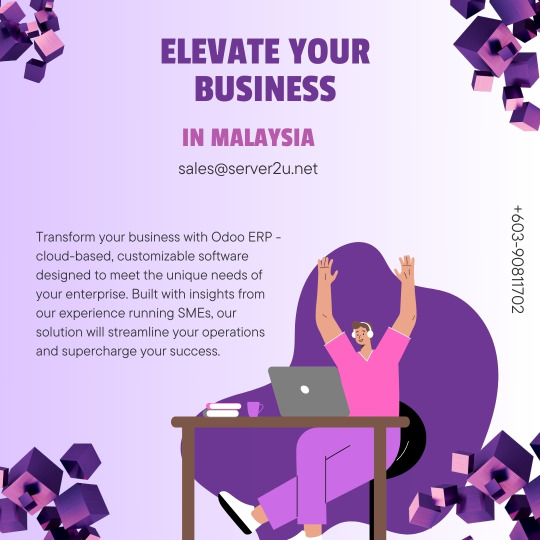
#erp solutions malaysia#internet#erp systems#erp customization malaysia#cloud erp malaysia#erp services#erp customization#erp support malaysia#odoo integration malaysia#erp consultation malaysia
0 notes
Text
#BhaaratERP#CRM software#HRM software#DigitalTransformation#ERP services#GSTbilling solution#Bhaaraterp solution#billing software
0 notes
Text
#oracle erp service providers#oracle services#oracle cloud services#erp services#erp software#oracle
0 notes
Text
How to Turn Your ERP Implementation from Failure to Success

Enterprise Resource Planning (ERP) systems are powerful tools that integrate various business processes into a unified system. ERP projects can benefit organizations significantly when implemented successfully through improved efficiency, streamlined operations, and better decision-making capabilities. However, there are several difficulties in the way of a successful ERP deployment, and many projects fall short of the goals that are set out to achieve. In this blog post, we will explore the causes of ERP failure and provide valuable insights on how to ensure yours is a success.
The causes of ERP failure
Just 40% of ERP implementations, on average, are successful, according to some studies. What undermines an ERP project's success, and more significantly, how can you ensure your implementation will be one of the success stories?
Poor requirement analysis: One of the primary causes of ERP failure is inadequate requirement analysis. Many organizations rush into ERP implementation without a thorough understanding of their unique business needs. This can lead to the selection of an ERP system that doesn't align with the company's processes and objectives. To avoid this pitfall, it's essential to conduct a comprehensive analysis of your organization's requirements before choosing an ERP solution provider like DataNote ERP software.
Not ensuring compatibility: Compatibility issues can arise when organizations fail to consider how the chosen ERP system will integrate with their existing software and hardware infrastructure. This oversight can lead to data inconsistencies, system crashes, and operational disruptions. To prevent compatibility-related problems, carefully assess how ERP software fits into your current IT ecosystem and address any integration challenges proactively.
Poor vendor selection and relationship management: Selecting the right ERP vendor is crucial for the success of your implementation. Choosing a vendor with a poor track record or inadequate support can set your project up for failure. Ensure you thoroughly research and vet potential vendors, considering factors like their experience, customer reviews, and post-implementation support. A strong vendor relationship, as you'll experience with DataNote ERP software, can make a significant difference in your ERP project's success.
Lack of planning and resource management: ERP implementations require meticulous planning and resource management. Inadequate project planning, insufficient budget allocation, and a shortage of skilled resources can derail your ERP project. It's vital to create a detailed project plan, allocate resources appropriately, and consider factors like project timelines and milestones. With DataNote ERP software, you'll have access to a range of planning and resource management tools to ensure a smooth implementation Production Planning and Control process.
Not enough testing or validation: Testing and validation are critical phases in ERP implementation. Failing to conduct thorough testing can result in undiscovered issues and defects that may disrupt your business operations. Make sure to rigorously test ERP software in your organization's real-world scenarios to identify and resolve any issues before going live.
Rushing the implementation: Attempting to rush an ERP implementation to meet tight deadlines can lead to problems down the road. A rushed implementation may result in errors, incomplete configurations, and inadequate training for your staff. Take the time to plan and execute your ERP project carefully, ensuring that DataNote ERP software is fully customized and aligned with your business processes.
Insufficient training or support: Inadequate training and support for your staff can hinder ERP adoption. If your employees don't know how to use ERP software effectively, the system's potential benefits may remain untapped. Invest in comprehensive training programs and ongoing support to empower your workforce and maximize the value of your ERP implementation.
Successful ERP implementation process
A successful ERP implementation can transform your organization. One research study reveals that a successful ERP implementation may improve company operations by up to 95%, while reducing operational and administrative costs by over 20%. Here's a step-by-step guide on how to ensure your ERP implementation is a resounding success:
Explore our latest blog to discover the strategies for converting your ERP implementation from failure to resounding success.
0 notes
Text
#odooimplementation#odoointegration#odoo16#odoodevelopment#odoo services#odoo crm#odoo developers#erpsoftware#odoo inventory#erp services#odooo
0 notes
Text

Boosting Efficiency: ERP Solutions for Manufacturers
Discover how our ERP Software Solution empower manufacturers to streamline operations, optimize resources, and drive growth. From production planning to supply chain management, we've got you covered. Experience the power of tailored ERP systems designed to meet the unique needs of manufacturing businesses.
0 notes
Text
Revolutionizing Efficiency: The Role of ERP Solutions in the Furniture Industry
In the fast-paced world of furniture manufacturing and retail, staying ahead of the competition requires not only creativity in design but also efficiency in operations. This is where ERP solutions system agency come into play, offering comprehensive tools and functionalities to streamline processes, optimize resources, and enhance productivity. In this article, we delve into the transformative impact of ERP solutions on the furniture industry, exploring their benefits, key features, and the role of ERP agencies in implementing these systems.
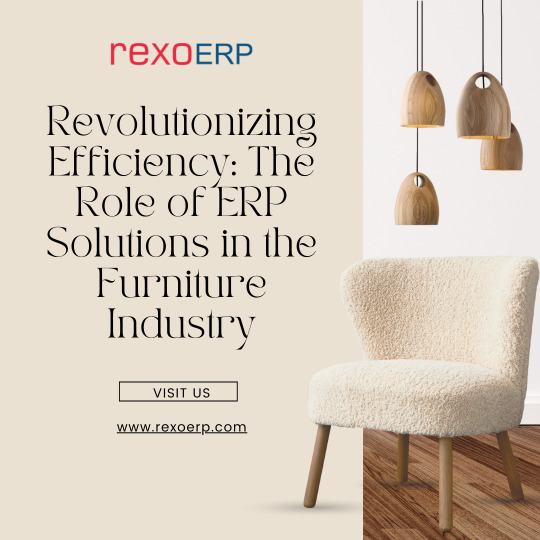
Understanding the Challenges of the Furniture Industry
The furniture industry is characterized by diverse challenges, ranging from fluctuating demand and supply chain complexities to inventory management issues and production inefficiencies. Furniture manufacturers and retailers often grapple with:
Inventory Management: Balancing inventory levels with demand forecasts while minimizing carrying costs and stockouts.
Production Planning: Optimizing production schedules, resource allocation, and lead times to meet customer orders efficiently.
Supply Chain Management: Managing multiple suppliers, sourcing raw materials, and ensuring timely deliveries while maintaining quality standards.
Sales and Distribution: Managing multiple sales channels, tracking customer orders, and ensuring on-time deliveries and installations.
Customer Service: Providing excellent customer service, handling inquiries, addressing complaints, and ensuring customer satisfaction.
The Role of ERP Solutions in the Furniture Industry
ERP solutions offer a holistic approach to addressing the challenges faced by the furniture industry by integrating and automating key business functions across the entire value chain. These solutions provide a centralized platform for managing:
Inventory Management: ERP systems enable furniture companies to track inventory levels in real-time, manage stock across multiple warehouses, and automate reorder processes based on demand forecasts and lead times.
Production Planning and Scheduling: ERP solutions facilitate efficient production planning by optimizing resource utilization, scheduling workflows, and aligning production schedules with demand forecasts and sales orders.
Supply Chain Management: ERP systems streamline supply chain processes by integrating with suppliers, automating procurement processes, and providing visibility into supplier performance and lead times.
Sales and Distribution: ERP solutions enable furniture companies to manage customer orders, track order status, and optimize delivery routes for timely and cost-effective deliveries. They also facilitate order customization and configuration to meet customer preferences.
Customer Relationship Management (CRM): ERP systems incorporate CRM functionalities to manage customer interactions, track sales opportunities, and provide personalized service to customers throughout the sales cycle.
Benefits of ERP Solutions for the Furniture Industry
The adoption of ERP solutions offers numerous benefits for furniture manufacturers and retailers, including:
Improved Efficiency: ERP systems streamline business processes, eliminate manual tasks, and reduce errors, leading to increased efficiency and productivity.
Enhanced Visibility: ERP solutions provide real-time insights into inventory levels, production status, and sales performance, enabling better decision-making and strategic planning.
Cost Reduction: By optimizing inventory management, production planning, and supply chain processes, ERP solutions help reduce operating costs, minimize wastage, and improve profitability.
Better Customer Service: ERP systems enable furniture companies to provide excellent customer service by ensuring timely deliveries, resolving issues promptly, and maintaining customer satisfaction.
Scalability and Flexibility: ERP solutions are scalable and customizable, allowing furniture companies to adapt to changing business requirements, market conditions, and growth opportunities.
The Role of ERP Agencies in Implementing ERP Solutions
ERP agencies play a crucial role in the successful implementation of ERP solutions in the furniture industry. These agencies offer a range of services, including:
Consultation and Needs Analysis: ERP agencies work closely with furniture companies to understand their business requirements, challenges, and objectives, and recommend the most suitable ERP solution.
Implementation and Customization: ERP agencies oversee the implementation process, including system configuration, data migration, and customization to meet the specific needs of furniture companies.
Training and Support: ERP agencies provide training to furniture company employees on how to use the ERP system effectively and offer ongoing support and maintenance services to ensure smooth operation.
Integration and Expansion: ERP agencies assist furniture companies in integrating the ERP system with existing systems and applications and provide support for system upgrades and expansions as needed.
Conclusion
In conclusion, ERP solutions play a pivotal role in revolutionizing efficiency and driving growth in the furniture industry. By streamlining processes, optimizing resources, and enhancing visibility across the entire value chain, ERP solutions enable furniture companies to stay competitive in a rapidly evolving market. With the support of ERP agencies, furniture companies can successfully implement and leverage ERP solutions to overcome challenges, maximize opportunities, and achieve sustainable success in the furniture industry.
0 notes
Text
Best Tour & Travel Agency CRM Software to Solve Business Challenges
Teknovate Travel Agency Software facilitates automation in Lead Capturing, Sales automation, follow-ups, Invoicing, Payment collections, Vendor Management indeed Intelligent Analytics. Our Travel CRM Software includes Sales follow-ups with the assistance of a Mobile App. It offers a user-friendly interface and seamless integration of SMS, calls, emails, and WhatsApp empowering streamlined and efficient communications with your valuable customers.
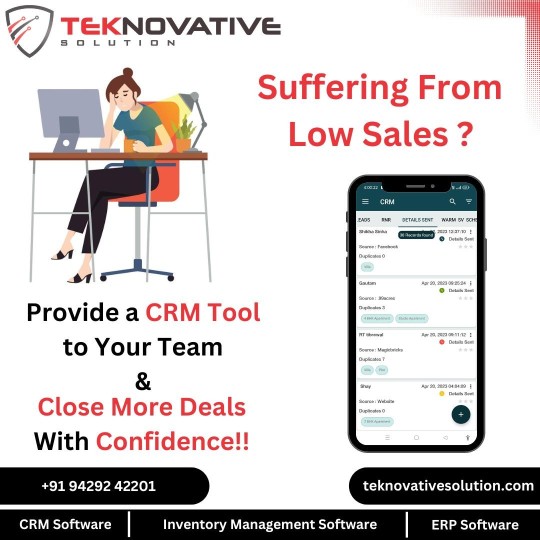
Here is How!
Exclusive CRM designed specifically for Travel Businesses.
Live Demo and walkthroughs.
Onboarding and Training Support.
Live Support via Anydesk, WhatsApp, and Calls.
Customizable to fulfill your each requirements.
User Friendly UI & UX
Regular updates to stay in sync with industry advancements.
Why Travel agency CRM is essential for your Travel Business?
It Centralises Lead Capture
Manages Sales Pipeline easily
Increase Mobile Accessibility & Productivity
Integrated Customer Service Center
Payment Settlement and invoicing
Manage your travel package in one place
Complete Client Packages in one place
Quotation and itinerary management
Data Analysis and Reporting
#travel crm software#travel agencies#travel agents near me#travel agent in delhi#travel agents in india#travel agency companies#travel business#erp software#erp services#crm software#software#salesforce#outsourcing#crm#web development
0 notes